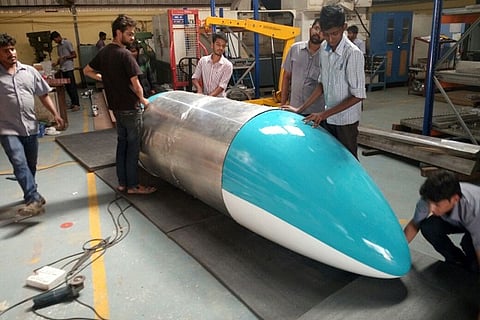

There is no time to rest for Hyperloop India’s Sibesh Kar and his team. With less than 12 hours to go, Hyperloop India - sponsored by Hindustan University - hopes to ship off their prototype, the OrcaPod, to the SpaceX Hyperloop Pod Competition in California.
Given that it’s the last leg of making the pod, giving it final touches and sending it for the competition, Sibesh and his team have been working night and day to make it happen. The team has been battling a number of real world engineering challenges, taking several crucial last-minute decisions.
At Ripple Technologies’ facility in Peenya in Bengaluru, a part of the team is feverishly working on the pod, while another group is running around all day to different vendors, bringing back all the components as the team gets ready to assemble the pod.
We tried catching up with Sibesh over the weekend, but he was saddled with last-minute preparations, figuring out ways to get things done faster. You can see it on his face – the determination to make the cheapest and most efficient pod and the tension of battling last-minute challenges.
“There is an unbelievable task ahead of us. These boys have been working day and night to get it done. Some of their colleges are about to begin and they haven’t even had the time to pay their fees. They haven’t even been getting the time to get a haircut. They start work at around 8am in the morning and stay here well past midnight. Some of them even sleep here in the cold,” says Pavan Kumar, founder of Workbench projects, which has partnered with Hyperloop India to build the Pod.
Right from the beginning, the journey has not been easy. Unlike the other teams that started work in March itself, the Hyperloop India team, consisting entirely of students, had to first finish college and then start work only in May.
They were lucky to have found Harish Palani who not only gave them some funds, but also let them build the pod at the facility of his engineering services company Ripple Technologies. With a decade of expertise in aviation and aerodynamics, he has been a blessing in disguise for the Hyperloop India team.
Hyperloop India was done with building 70% of the OrcaPod. What was left was testing the electronics, assembling the parts and some final touches like anodizing and painting.
But when the nose of the Pod came from the vendor, the final shape of the nose was not what was originally envisaged. The angle was not right and the OrcaPod would not have achieved the required aerodynamics if they were to go with this design.
This meant that with just a few days left for the pod to be sent for the competition, Hyperloop India had to find a different vendor.
While the nose of the Pod was originally being made using aluminium, the new nose is now being made with Fibre-reinforced Plastic (FRP).
The nose of the Pod is extremely important for the team because Hyperloop India’s OrcaPod has been designed in a way that it has a unique nose-operating mechanism. This means that instead of a side-opening mechanism, the OrcaPod opens from the front and back.
However, there have been a few last-minute surprises as well.
A few weeks ago, Hyperloop India was still struggling with funds as the crowdfunding campaign was not going as well as expected.
The team was trying to raise about Rs 30 lakh from crowdfunding and as of July 18, they had managed to raise only Rs 8 lakh.
To provide some context, the entire project of building and transporting the Pod was costing the team nearly one crore rupees. The OrcaPod in itself has cost Rs 60 lakhs to make.
But in a sudden bonanza, an alumnus of Birla Institute of Technology and Sciences gave about $11,000-12,000 dollars. With that, they covered about 90% of the total pledged amount.
And what was initially seen as not taking off, did work out after all. As on August 6, Hyperloop India team not only reached the goal of Rs 30 lakh rupees but raised around Rs 11,000 more.
Hyperloop India is trying to create history by being the only team from India to build a prototype of the pod. The prototype they are building currently is 1/4th the size of the original pod.
The clock is ticking. By Monday night, the pod has to, at all costs, leave for California. If not, Pavan says that there is no other flight or no other way the pod can be transported in time for the SpaceX Hyperloop Pod Competition in California.